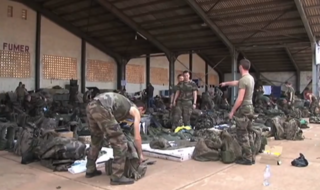This article has multiple issues. Please help improve it or discuss these issues on the talk page. (Learn how and when to remove these messages)
|
| Operation Serval | |||||||
|---|---|---|---|---|---|---|---|
| Part of the Mali War and the Islamist insurgency in the Sahel | |||||||

| |||||||
| |||||||
| Belligerents | |||||||
|
|
| ||||||
| Commanders and leaders | |||||||
|
|
| ||||||
| Strength | |||||||
|
4,000 French troops deployed (5,100 involved in total),[5] |
Elements of: | ||||||
| Casualties and losses | |||||||
|
|
Between 600 and 1,000 killed[17][18] 50 vehicles destroyed, 150 tons of ammunitions and 200 weapons seized, 60 IEDs defused[10] 109-300 captured[19] | ||||||
Operation Serval (French: Opération Serval) was a French military operation in Mali.[20] The aim of the operation was to oust Islamic militants from the north of Mali,[21] who had begun a push into the center of Mali.[22]
Operation Serval followed the United Nations Security Council Resolution 2085 of 20 December 2012 and an official request by the Malian interim government for French military assistance.[23] The operation ended on 15 July 2014, and was replaced by Operation Barkhane, launched on 1 August 2014 to fight Islamist fighters in the Sahel.[24] Three of the five Islamic leaders, Abdelhamid Abou Zeid, Abdel Krim and Omar Ould Hamaha were killed, while Mokhtar Belmokhtar fled to Libya and Iyad ag Ghali[25] fled to Algeria.[26]
The operation is named after the serval, a medium-sized African wild cat.
- ^ a b Comolli (2015), pp. 28, 103, 171.
- ^ Daniel, Serge (30 March 2012). "Mali's isolated junta seeks help to stop Tuareg juggernaut". Modern Ghana. Retrieved 13 January 2013.
- ^ Nossiter, Adam; Schmitt, Eric (18 July 2012). Baquet, Dean; Louttit, Meghan; Corbett, Philip; Chang, Lian; Drake, Monica; Kahn, Joseph; Kingsbury, Kathleen; Sulzberger, A.G.; Levien, Meredith Kopit; Caputo, Roland A.; Bardeen, William; Dunbar-Johnson, Stephen; Brayton, Diane (eds.). "Jihadists' Fierce Justice Drives Thousands to Flee Mali". Africa section (World section). The New York Times. Vol. CLXI, no. 139. New York City, United States. p. A1. ISSN 0362-4331. OCLC 1645522. Archived from the original on 26 July 2019. Retrieved 5 June 2021.
- ^ "Un haut responsable d'Ansar Dine tué à Konna". 7SUR7.be. Retrieved 22 November 2013.
- ^ "4600 soldats français mobilisés". Ledauphine.com. 31 January 2013. Retrieved 22 November 2013.
- ^ "Opération Serval: point de situation du 28 janvier 2013" (in French). Defense.gouv.fr. 28 January 2013. Retrieved 22 November 2013.
- ^ a b c Salomé Legrand (14 January 2013). "Qui sont les islamistes à qui la France a déclaré la guerre ?". France Info. Retrieved 22 November 2013.
- ^ "One more French soldier killed in Mali". Xinhua News Agency. 15 July 2014. Archived from the original on 19 July 2014. Retrieved 15 July 2014.
- ^ In Memoriam
- ^ a b "RETEX Mali : les hommes et les matériels ont souffert mais ont tenu". defense.blogs.lavoixdunord.fr. 4 October 2013. Retrieved 15 January 2013.
- ^ a b c d "63 Mali soldiers, 600 Islamists 'killed this year'". En.starafrica.com. Archived from the original on 13 March 2016. Retrieved 22 November 2013.
- ^ "2 Killed, 1 Wounded in Mali Blasts". Voice of America. 31 March 2013. Retrieved 22 November 2013.
- ^ "Cinco militares mueren en Malí en un accidente de helicóptero". Terra. 12 April 2013. Retrieved 12 April 2013.
- ^ Nasser, Heba (27 August 2013). Haboush, Joseph; Habib, Osama; Nasser, Heba; Merehbi, Nazha; Quilty, Jim; Jabra, James; Obeid, Christele; Abboub, Nisrin; Halwain, Nadine; Mrowa, Kamel; Elbissar, Salma; Mrowa, Malek; Mrowa, Karim; Mroue, Jamil; Feghali, Madona (eds.). "Mali's new president thanks Chad for support against Islamists". The Daily Star (Libya). Bamako, Mali: The Daily Star Group. Agence France-Presse. Archived from the original on 3 July 2020. Retrieved 6 June 2021.
- ^ "Two Killed, Four Injured in Bomb Attacks on Mali-bound Nigerian Troops at Okene". Saharareporters.com. 19 January 2013. Archived from the original on 13 December 2013. Retrieved 22 November 2013.
- ^ "Car bomb kills UN peacekeepers in Mali". Al Jazeera English (Al Jazeera). Doha, Qatar: Al Jazeera Media Network (AJMN). Reuters. 14 December 2013. Archived from the original on 1 April 2021. Retrieved 6 June 2021.
- ^ "Mali : retour sur l'opération Serval avec le général Barrera". defense.blogs.lavoixdunord.fr. 1 October 2013.
- ^ 25 killed (10-20 March)[1] 21 killed (30 March)[2] 2 killed (12 April)[3] 5 killed (10 May)[4] 7 killed (18 May)[5]
- ^ "Torture, beatings, and death for detained Malians". United Nations. IRIN. 15 April 2013. Retrieved 30 April 2013.
- ^ "la France a mené une série de raids contre les islamistes". Le Monde (in French). 12 January 2013. Retrieved 15 January 2013.
- ^ Hugh Schofield (12 January 2013). "Mali and France 'push back Islamists'". BBC. Retrieved 15 January 2013.
- ^ Nossiter, Adam; Schmitt, Eric; Gladstone, Rick; Sayare, Scott (12 July 2013). Baquet, Dean; Louttit, Meghan; Corbett, Philip; Chang, Lian; Drake, Monica; Kahn, Joseph; Kingsbury, Kathleen; Sulzberger, A.G.; Levien, Meredith Kopit; Caputo, Roland A.; Bardeen, William; Dunbar-Johnson, Stephen; Brayton, Diane (eds.). "Jihadists' Fierce Justice Drives Thousands to Flee Mali". Africa section (World section). The New York Times. Vol. CLXII, no. 140. New York City, United States. p. A1. ISSN 0362-4331. OCLC 1645522. Archived from the original on 1 March 2021. Retrieved 5 June 2021.
- ^ Security Council Authorizes Deployment of African-led International Support Mission in Mali for Initial Year-Long Period (full text of the resolution)
- ^ Au Sahel, l'opération «Barkhane» remplace «Serval» (in French)
- ^ "Le terroriste islamiste Mokhtar Belmokhtar serait en Libye". Radio France Internationale. Archived from the original on 16 December 2018. Retrieved 21 September 2014.
- ^ Jeune Afrique : Mali : Iyad Ag Ghaly se cache en Algérie, selon les services français
